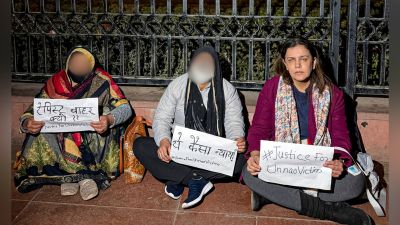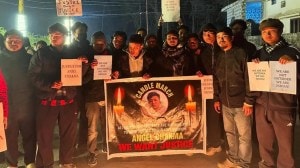Call from Mecca
The three-day Islamic inter-faith international conference organised by the highly esteemed Rabita Alam-e-Islami...

The three-day Islamic inter-faith international conference organised by the highly esteemed Rabita Alam-e-Islami Organisation for World Islamic Interface at Mecca June 4-6, hardly covered by the English press, has been widely covered in the Urdu broadsheets. The main feature of the five-point joint communiqueacute; described as the Mecca Declaration, according to a comprehensive lead report in Delhi-based Hindustan Express June 8, was its emphasis on the need for 8220;rising above colour, race, country and religion8221; and working 8220;unitedly for the promotion of the culture of peace and conciliation8221;. The Declaration laid stress on using the teaching of Prophet Mohammed for resolving controversial issues through 8220;tolerance, patience and forbearance8221; as a guiding force.
According to Delhi-based Hamara Samaj June 7, the Declaration advocated 8220;opening of doors for mutual dialogue with leaders of other religions, particularly Judaism, Christianity and Hindu Dharma to put an end to doubts and apprehensions.8221; Rashtriya Sahara in its editorial June 9 described the Mecca Declaration as a 8220;positive step8221; but stated that a proper environment would have to be created for giving practical shape to the sentiments expressed in Mecca.
Among the large number of participants of the conference were King Abdullah of Saudi Arabia, former Iranian President Ayatollah Akbar Hashmi Rafsanjani and religious personalities like the rector of Dar ul Uloom Deoband, Maulana Maghroob-ur-Rehman and the Jamaat-e-Islami chief, Maulana Jalaluddin Umri.
Tough on hike
The increase in the prices of petroleum products has provoked different views. Taking a tough line, Hyderabad -based Rahnuma-e-Deccan in its editorial on June 6, has described the price rise as a 8220;blatant anti-people step8221; sarasar awaam dushman qadam. It has analysed in detail the various duties and taxes levied on petroleum products and argued that the cuts in levies announced by the Centre and certain state governments including the 100 per cent subsidy on cooking gas by the Andhra Pradesh government amount to 8220;giving with one hand and taking back with another8221;. Delhi-based The Daily Milap has said that every Indian could feel that the government must have raised prices under 8220;great compulsion8221; . No government would have agreed to taking such a step otherwise. Hind Samachar, published from Jalandhar and Ambala, says, 8220;the hike would promote the use of bicycles and walking that would keep people fit and healthy.8221;
Barack 8216;Darling8217;
During the campaign for the Democratic nomination for the US presidential election, the Urdu press has been partial towards Obama. His victory over Hillary Clinton has been generally welcomed. Hamara Samaj in its editorial on June 9 has welcomed the fact that 8220;Obama has promised riddance from the wars in Afghanistan and Iraq and this assurance has had a positive effect on the American people.8221; Hindustan Express June 6 says, 8220;the fearlessness and frankness of Obama has made him a darling of not only Democrat delegates but the whole world8221;. The likely election of Obama and a perception about a likely change in the powers that be in Washington are 8220;being considered in West Asia and the sub-continent as the beginning of a new era.8221; The paper has shown its disappointment at Obama8217;s recent statement regarding Israel he had termed himself a true friend of Israel, and said that Jerusalem would remain the capital of Israel. But it draws consolation from the possibility of this being a part of his election strategy as 8220;it is not easy for anyone to win the presidency without the support of the Israeli lobby.8221;
Well-known writer and journalist Hassan Kamal, in his column in Rashtriya Sahara June 14 has welcomed Obama8217;s emergence saying that 8220;during his campaign, Obama has not given any open clear statement in favour of Israel8221;, and has quoted one of his statements that 8220;Israel plays the role of a state within the state, in the United States and Israel has not only been influencing the policies of the US, it has been actually formulating the policy of the US state towards itself.8221;
Husbands on hire?
According to a report in The Hindustan Express June 17, many divorced women in Saudi Arabia are preferring unemployed men as husbands. In such cases, the husbands are paid a 8216;salary8217; by their wives, who retain the right to divorce their hired husbands at will. Some women who have entered into such marriages are reported to be comfortable in the arrangement as 8220;they get a legal 8216;guardian8217; who is, in fact, a subordinate, not a master8221;. In some cases, the hired husbands are much younger than their wives, and are promised marriage with a younger woman after a few years.
- 01
- 02
- 03
- 04
- 05































